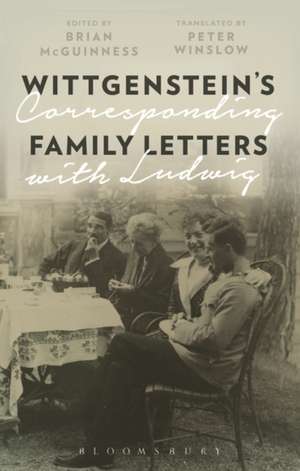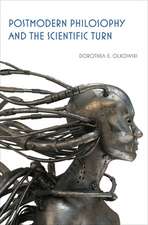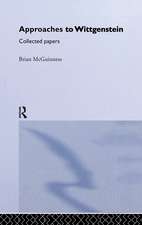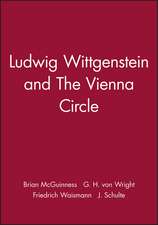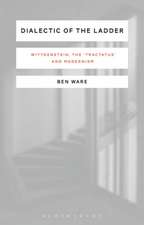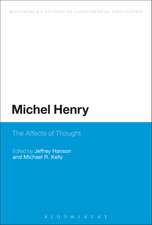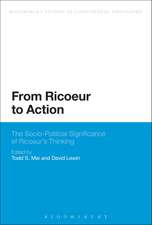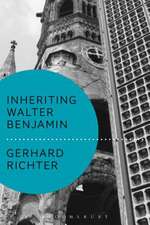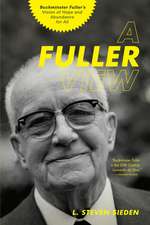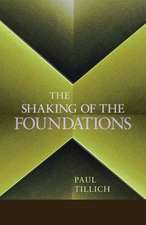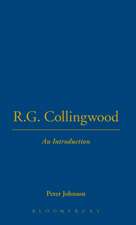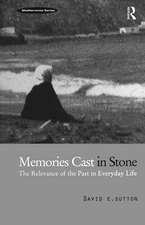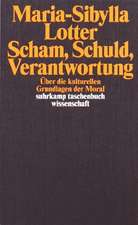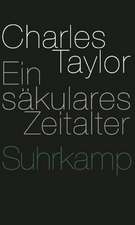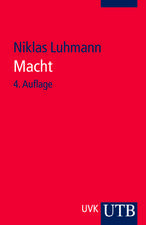Wittgenstein's Family Letters: Corresponding with Ludwig
Editat de Brian McGuinness Traducere de Peter Winslowen Limba Engleză Hardback – 28 noi 2018
In letters written over forty years, we see how his ideas and relationships developed during his time as a prisoner of war, a school teacher, an architect and throughout his years at Cambridge.
Always frank and often brutally honest, these letters between Wittgenstein, his brother Paul and his three sisters, Hermine, Margaret and Helene are filled with a familiarity and an intimacy. They allow us to enter the bygone world of an extraordinary family, revealing a side of Wittgenstein we have never seen before.
| Toate formatele și edițiile | Preț | Express |
|---|---|---|
| Paperback (1) | 105.46 lei 3-5 săpt. | +91.74 lei 6-10 zile |
| Bloomsbury Publishing – 8 iul 2020 | 105.46 lei 3-5 săpt. | +91.74 lei 6-10 zile |
| Hardback (1) | 288.50 lei 3-5 săpt. | |
| Bloomsbury Publishing – 28 noi 2018 | 288.50 lei 3-5 săpt. |
Preț: 288.50 lei
Preț vechi: 313.26 lei
-8% Nou
Puncte Express: 433
Preț estimativ în valută:
55.20€ • 60.15$ • 46.52£
55.20€ • 60.15$ • 46.52£
Carte disponibilă
Livrare economică 02-16 aprilie
Preluare comenzi: 021 569.72.76
Specificații
ISBN-13: 9781474298131
ISBN-10: 1474298133
Pagini: 336
Ilustrații: 50 B&W images
Dimensiuni: 138 x 216 x 35 mm
Greutate: 0.54 kg
Editura: Bloomsbury Publishing
Colecția Bloomsbury Academic
Locul publicării:London, United Kingdom
ISBN-10: 1474298133
Pagini: 336
Ilustrații: 50 B&W images
Dimensiuni: 138 x 216 x 35 mm
Greutate: 0.54 kg
Editura: Bloomsbury Publishing
Colecția Bloomsbury Academic
Locul publicării:London, United Kingdom
Caracteristici
The
first
English
translation
of
letters
between
Ludwig
Wittgenstein
and
his
siblings,
Hermine,
Gretl,
Margaret
and
Paul
Notă biografică
Brian
McGuinnessis
Professor
of
the
History
of
Philosophy
at
the
University
of
Siena,
Italy.
He
is
author
ofTractatus
Logico-Philosophicus(with
David
Pears)
andA
Life
of
Wittgenstein(Volume
1,Young
Ludwig,1988).Peter
Winslowis
a
professional
translator.
He
has
translated
the
work
of
Karl
Kraus.
Cuprins
Introduction,Brian
McGuinnessAcknowledgementsLudwig's
Early
Letters1908The
War
YearsAugust
1914-April
1918CaptivityNovember
1918-September
1919The
Tractatus
and
the
elementary
school
yearsOctober
1920-March
1926A
Viennese
intermezzoa
letter
from
late
1928?CambridgeJanuary
1929-February
1938
121The
Anschluss
and
World
War
TwoMarch
1938-May
1945
172Ludwig's
last
lettersJanuary
1946-April
1951
Recenzii
Anyone
interested
in
the
period,
the
Wittgenstein
family,
or
the
lost
art
of
letter
writing
will
find
this
a
delightful
read.
Summing
Up:
Essential.
Lower-division
undergraduates
through
faculty;
general
readers.
This meticulously edited and superbly translated volume of letters written between 1908 and weeks before Ludwig's death in 1951 swings seamlessly between mundane trivialities and profound insights ... The letters offer incredible insight into Wittgenstein.
The letters Wittgenstein exchanged with his siblings and other family members make fascinating reading for the light they shed on his cultural background, particularly the central role that music played in his life. Here, they are presented in a beautiful edition, superbly translated and edited.
There are not many families of the twentieth century as fascinating as the Wittgensteins. This is a valuable and often moving collection. The letters reveal how tight the bonds between family members were - but they also expose the tensions, that led ultimately to an irreparable split.
This beautifully illustrated and edited translation of Wittgenstein's correspondence with his family will appeal to anyone interested in learning more about his life or in exploring connections between his life and work. The present edition includes a new introduction, family tree, an annotated list of people and places and informative footnotes, all of which will be invaluable to readers.
Wittgenstein fans will want this newly translated, intimate look over 40 odd years into the on-going soap opera that characterized the Wittgenstein family, ranging from personal hurts to life-or-death decisions; ranging from aesthetic, mainly musical, judgments to assessments of the obligations of friendship and family relations. It includes some three dozen newly published letters between Ludwig and his brother Paul.
The publication of this, the first English translation of the correspondence between Ludwig Wittgenstein and family-specifically, with his siblings Hermine, Margarete, Helene, and Paul-is an important event. As Brian McGuinness says in his incisive introduction, "The Wittgenstein's were a family that might well have figured in one of the nineteenth century sagas they read." A close but often contentious family, the siblings, especially Ludwig's elder sister Hermine, wrote long and detailed letters to their famous brother; he responded with unusual candor -and often severity-- and so we learn a great deal about the Wittgenstein way of doing things-which was by no means always Ludwig's way. The letters of the World War II years are especially interesting. This excellent translation by Peter Winslow, thoroughly annotated and copiously illustrated, is a real page-turner.
What does the correspondence have to offer beyond specialist interest? One answer, surprisingly, is pleasure. The siblings - 'rather hard and prickly elements', Ludwig calls them - slowly develop their own characteristics in the reader's mind ... The letters also offer a startling insight into what it meant to be a wealthy Viennese family in the early 20th century.
This meticulously edited and superbly translated volume of letters written between 1908 and weeks before Ludwig's death in 1951 swings seamlessly between mundane trivialities and profound insights ... The letters offer incredible insight into Wittgenstein.
The letters Wittgenstein exchanged with his siblings and other family members make fascinating reading for the light they shed on his cultural background, particularly the central role that music played in his life. Here, they are presented in a beautiful edition, superbly translated and edited.
There are not many families of the twentieth century as fascinating as the Wittgensteins. This is a valuable and often moving collection. The letters reveal how tight the bonds between family members were - but they also expose the tensions, that led ultimately to an irreparable split.
This beautifully illustrated and edited translation of Wittgenstein's correspondence with his family will appeal to anyone interested in learning more about his life or in exploring connections between his life and work. The present edition includes a new introduction, family tree, an annotated list of people and places and informative footnotes, all of which will be invaluable to readers.
Wittgenstein fans will want this newly translated, intimate look over 40 odd years into the on-going soap opera that characterized the Wittgenstein family, ranging from personal hurts to life-or-death decisions; ranging from aesthetic, mainly musical, judgments to assessments of the obligations of friendship and family relations. It includes some three dozen newly published letters between Ludwig and his brother Paul.
The publication of this, the first English translation of the correspondence between Ludwig Wittgenstein and family-specifically, with his siblings Hermine, Margarete, Helene, and Paul-is an important event. As Brian McGuinness says in his incisive introduction, "The Wittgenstein's were a family that might well have figured in one of the nineteenth century sagas they read." A close but often contentious family, the siblings, especially Ludwig's elder sister Hermine, wrote long and detailed letters to their famous brother; he responded with unusual candor -and often severity-- and so we learn a great deal about the Wittgenstein way of doing things-which was by no means always Ludwig's way. The letters of the World War II years are especially interesting. This excellent translation by Peter Winslow, thoroughly annotated and copiously illustrated, is a real page-turner.
What does the correspondence have to offer beyond specialist interest? One answer, surprisingly, is pleasure. The siblings - 'rather hard and prickly elements', Ludwig calls them - slowly develop their own characteristics in the reader's mind ... The letters also offer a startling insight into what it meant to be a wealthy Viennese family in the early 20th century.
